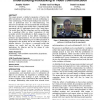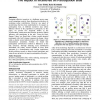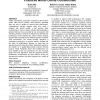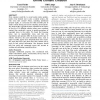CSCW
2016
ACM
8 years 11 months ago
2016
ACM
Past research suggests that many individuals take Massive Open Online Courses (MOOCs) for employment-related reasons. It is unclear, however, how learners leverage MOOCs for emplo...
CSCW
2016
ACM
8 years 11 months ago
2016
ACM
This paper presents a detailed examination of factors that affect perceptions of and attitudes towards multitasking in video conferencing. We first report findings from interviews...
CSCW
2016
ACM
8 years 11 months ago
2016
ACM
CSCW
2016
ACM
8 years 11 months ago
2016
ACM
Personalized support for students is a costly gold standard in education, but it scales poorly with the number of students. Prior work on learnersourcing presented an approach for...
CSCW
2016
ACM
8 years 11 months ago
2016
ACM
Although the Cuban government has tightly controlled information access for more than half a century, a small number of Cubans have access at work. In this paper, we examine Inter...
CSCW
2016
ACM
8 years 11 months ago
2016
ACM
Designing effective incentives is a challenge across many social computing contexts, from attracting crowdworkers to sustaining online contributions. However, one aspect of incent...
CSCW
2016
ACM
8 years 11 months ago
2016
ACM
CSCW
2016
ACM
8 years 11 months ago
2016
ACM
Distributed meetings can be messy, particularly when the task requires collaboration around multimedia artifacts. Teams must not only share a variety of materials related to the w...
110
click to vote
CSCW
2016
ACM
8 years 11 months ago
2016
ACM
Online communities, much like companies in the business world, often need to transfer “best practices” internally from one unit to another to improve their performance. Organi...
CSCW
2016
ACM
8 years 11 months ago
2016
ACM
From amateur creativity to social media status updates, nearly every Internet user is also a content creator—but who owns that content? Policy, including intellectual property...




